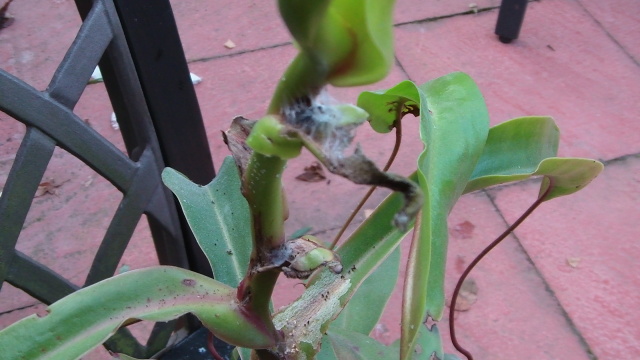Question Nepenthes Pests
Nepenthes Pests
QUESTION: Hi there, I have a nepenthes deroose alata, which has done very well through the summer months. As it is now indoors, I have recently noticed a few issues:
1 - pretty much all over the plant there are these tiny black dots, some yellowish in colour. They don't seem to move. I have since washed them off as best as I could
2 - where some leaves diverge from the vine, there is a cob web like substance which some of these black dots seem to stay in
3 - Also on some leaves where they diverge from the vine is a brownish area, which some of the black dots sit on
4 - some of the new leaves seem a bit small and flimsy. Is this related to these black dots, or just due to low light?
What do all these sound like to you and what can I do to solve the problem? The plant grows in a west facing window, watered with rain water. I am in England. The attached photo should help.
Many thanks, Chris.
ANSWER: Hi Chris,
This sounds and looks very much like spider mites. (Thank-you for sending the photo.) These can be a very tough customer to eradicate, so I'm going to give you a few options, since I'm not sure what you have access to in the U.K.
The first is a non-toxic, but very effective biological option. See if you have any garden/hydroponic dealers that carry predatory mites. These can be more effective in the long run with spider mites, and they are what keep spider mites in check in nature. I had a Plumeria tree last year that developed a bad mite infestation after being taken out of the greenhouse to go outside for the summer. I was going to spray it, but I noticed that after a couple of weeks the mites began disappearing. After doing some research I realized what was happening was the natural mite predators outside found the tree and began eating the spider mites. When plants are indoors the predators are not as prevalent, or around at all. If you can release some of these on your plants, it could do the trick. Be sure to get a hand lens and look at the bugs, because they may ask you to try and identify the mite species so you can get the right predator.
Chemical Warfare. If you have insect strips in England these can be helpful. Here in the US they are often called "No-Pest Strips" and other brand names. They are yellow wax strips imbedded with an insecticide called Dichlorvos. It's a vapor used to kill flies in buildings. If you take one of these and hang it on your plant, then cover it with a clear plastic bag, it will kill the mites very well since arachnids are very sensitive to the chemical. It takes a few days.
As far as sprays, spider mites are very resistant to insecticides, but the one most likely to be effective is Acephate. It goes by brand names such as Orthene, Isotox, and is sold either as a liquid concentrate or wettable powder. Many products for roses also have it. It is a systemic insecticide and kills by poisoning chewing/sucking insects.
In the case of both of these chemical options they are nasty. Both are quite toxic, so be sure to follow directions on labels. Let me know what you can find, and how it works.
Good Growing!
Jeff Dallas
Sarracenia Northwest
http://www.cobraplant.com
---------- FOLLOW-UP ----------
QUESTION: Hi there, thanks for identifying this for me. This is not so much to inform you of results, instead I would like to know a few more things before I commit to use anything. As it is approaching winter over here, like it is in OR, my nepenthes is growing indoors in my bedroom, so this could pose a few issues.
I would like to know a little more about the sprays.
Sprays seem the best option, but I don't want to fill my room with toxic chemicals. If the insecticide is systemic it will surely be lingering in the soil when I bring the plant back inside, if for example, I applied the insecticide outside?
Would this matter or contaminate my room because it is toxic? I have no where else to keep my plant and as said I don't want to transfer any fumes/ toxic chemicals to my room. The other thing, wouldn't it wash out because I top water my nepenthes or is it absorbed very quickly into the plant?
Thanks,Chris
AnswerHi Chris,
I run into this all the time when orchids or other plants get pests during the winter. I'll usually try and take the plant(s) outside if the weather isn't too cold, or maybe a garage and spray them. Once the spray is dry it is of little harm. You may notice a little odor, but it shouldn't be bad. Systemic insecticides absorb into the leaves quickly and stay in the plant for around 30 days.
A couple things I thought of after answering your first question. The first was, be sure an look at the label of the product you use and make sure it has spider mites listed as one of the listed pests, and to follow the frequency of spraying it says. Usually the first round of mites will be killed, but the eggs hatch and you have a new batch. You have to spray again when that happens. Also, one other insecticide I remembered that is effective against mites is Permethrin. This is the same insecticide used in a product called "Elimite" used to kill Scabies in humans. It is quite safe around people, but is not systemic, so you would need to pay special attention to the spray frequency directions. It also doesn't smell as bad as Acephate.
Good Growing!
Jeff Dallas
Sarracenia Northwest
http://www.cobraplant.com






